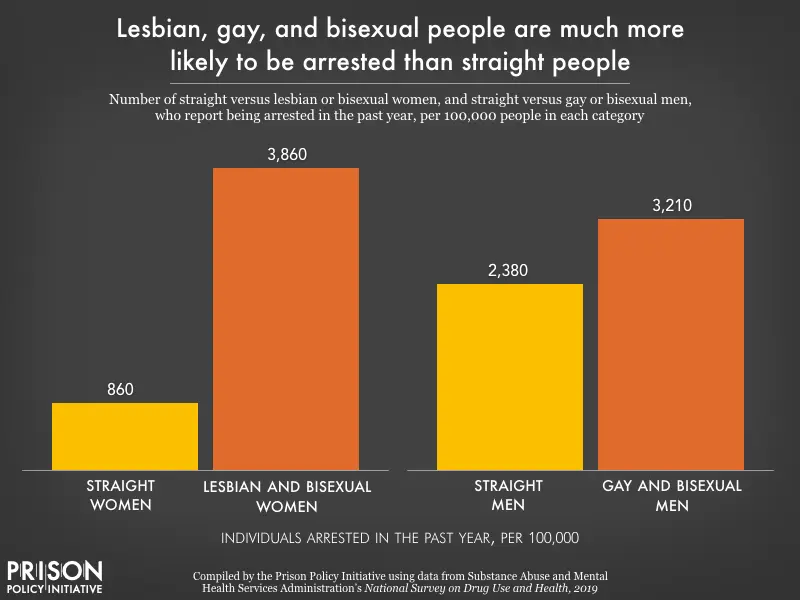Unequal Treatment of LGBTQ+ People in the Justice System
LGBTQ+ people are arrested, incarcerated, and subjected to community supervision at significantly higher rates than straight and cisgender people

June brings about Pride Month in the United States, and celebrating Pride this year is done in defiance of the almost 500 anti-LGBTQ+ bills pending or passed in state legislatures around the country. Unsurprisingly, these attacks are turning to the criminal legal system to enforce homophobia and transphobia.
Queer people have always been over-criminalized and over-incarcerated. This is especially true for Black trans women and other trans women of color. According to the Sentencing Project, LGBTQ+ adults are incarcerated at three times the rate of the general population. Among trans people, 1 in 6 report being incarcerated at any point in their lives, and nearly half of those are Black trans people.
LGBTQ+ people live in a social reality that makes their lives much more precarious. For example, LGBTQ+ people are more likely to experience discrimination in housing and employment, meaning they are more likely to experience poverty and homelessness. Because our nation criminalizes people for poverty, LGBTQ+ people are more likely to be arrested and get trapped in the criminal legal system.
For LGBTQ+ people, criminal justice involvement often starts at a young age. LGBTQ+ youth are extremely overrepresented in the juvenile justice system. Researchers estimate that 20% of youth in the juvenile justice system are lesbian, gay, bisexual, questioning, gender nonconforming, or transgender compared with 4-6% of youth in the general population. The same research shows that 40% of girls (who were assigned female at birth) in the juvenile justice system identify as LBQ and/or gender nonconforming. This overrepresentation is largely due to the obstacles that LGBTQ+ youth face after fleeing abuse and lack of acceptance at home because of their sexual orientation or gender identity. In order to survive, LGBTQ+ youth are pushed towards criminalized behaviors such as drug sales, theft, or survival sex, which increase their risk of arrest and confinement.
Governments criminalize queer people’s mere existence, and Black trans women and trans women of color are especially vulnerable. Police use laws criminalizing sex work to target trans women of color for “walking while trans.” For example, The New York Times reported in 2016, police used the extremely broad “anti-loitering” law to profile trans women of color as sex workers, including based on their appearance: they were “arrested while wearing short dresses or high heels or tight pants and, in one bizarre instance, that well-known symbol of sexual seduction: a black pea coat.” The law was finally repealed in 2021.
There is significantly less data available on trans individuals in the criminal justice system. There is no data on transgender arrest rates, but other research shows police are extremely biased against trans people, especially Black trans people. According to the National Center for Transgender Equality and the National Gay and Lesbian Task Force’s Injustice at Every Turn: A Report of the National Transgender Discrimination Survey, nearly half of trans people reported that they do not feel comfortable seeking help from police. 1 in 5 trans people who have had police contact reported that they have been harassed by police, include 38% of Black trans individuals. Six percent reported that police have physically assaulted them and 2% reported that police have sexually assaulted them. Assault rates were even higher for Black trans people, with 15% reporting physical abuse and 7% of them reporting sexual assault by police.
Ending mass incarceration and over criminalization must be, and has always been, a central part of the movement for LGBTQ+ liberation. What brought about the celebration of Pride was the 1969 Stonewall Riots, when New York City police raided the Stonewall Inn, a gay club located in Greenwich Village in New York City. The raid sparked a riot among bar patrons and neighborhood residents as police roughly hauled employees and patrons out of the bar, leading to six days of protests and violent clashes with law enforcement, when queer and trans people were simply asserting their right to live freely.
To read more about the criminalization and over-incarceration of LGBTQ+ adults and youth, you can read and download the report "Incarcerated LGBTQ+ Adults and Youth" from The Sentencing Project, a non-profit organization that advocates for effective and humane responses to crime that minimize imprisonment and criminalization of youth and adults by promoting racial, ethnic, economic, and gender justice..










